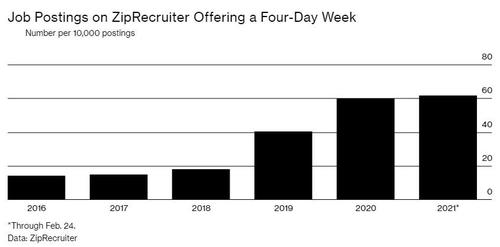The Four Day Work Week Is Catching On
As Covid has likely forever changed the work landscape for many companies, more and more institutions are even starting to experiment with a four day work week.
Awin Chief Executive Officer Adam Ross, who made the change at his company, allowing his workers to leave early on Fridays, recently told Bloomberg: “We firmly believe that happy, engaged, and well-balanced employees produce much better work. They find ways to work smarter, and they’re just as productive.”
And its not just Awin. It’s a trend that is growing much larger around the globe. For example, according to ZipRecruiter, postings that have mentioned a four day work week have tripled over the last three years, to 62 per 10,000 postings. Major companies like Unilever are even experimenting with the four day work week. Spain’s government is looking into whether to subsidize the idea and it is even catching on in Japan.
Will Stronge, director of research at Autonomy, said: “The four-day week is picking up momentum. For the large majority of firms, reducing working hours is an entirely realistic goal.”
The question is will the new schedule catch on. Six or seven day work weeks have been the norm since the late nineteenth century, Bloomberg notes. Even nowadays, popular billionaires like Jack Ma have hailed a six day a week work week as “vital for long-term success”. Bloomberg also noted that “in the U.K., the Labour Party lost the 2019 general election even as it campaigned on a pledge to trim the standard workweek to 32 hours within a decade.”
The push to change workplace environments has been pronounced coming out of Covid. And the four day work week is showing improved productivity, according to a study from the University of Reading. There has also been a push to move to a four day work week to “rethink working patterns, and reduce energy consumption.”
Germany’s 2.3-million-member IG Metall proposed the idea when Covid started to wreak havoc on the auto industry, as did a group led by former U.K. Shadow Chancellor John McDonnell. Renault SA is giving about 13,000 of its workers Fridays off until mid-August as it looks to cut costs.
Ross said that at his company, he has an 80 employee task force helping with the transition – which includes deciding which employees will be off when and figuring out the logistics of having his finance department work five days a week.
“The experience has been so positive that he can’t imagine going back,” he told Bloomberg. “Companies used to make provisions for people’s physical health but never their mental health. I see that changing, and we want to be a driver for it.”
Tyler Durden
Fri, 03/05/2021 – 20:40
via ZeroHedge News https://ift.tt/3c2QKX6 Tyler Durden
